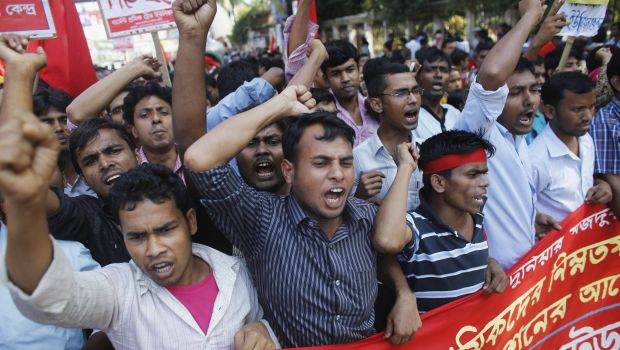
Activists and garment workers shout slogans during a protest demanding a minimum wage of 8,000 Bangladeshi Taka (USD 100) in Dhaka on November 8, 2013. (REUTERS/Andrew Biraj)
Bangladesh’s official wage board proposed a 77 percent rise in the minimum wage for garment workers last week after a string of fatal factory accidents this year thrust poor pay and conditions into the international spotlight.
The present minimum monthly wage of USD 38 is around half that of rival Asian exporters Vietnam and Cambodia and just over a quarter of the rate in top exporter China, according to International Labour Organization data from August.
But factory owners said they could not afford 77 percent.
Police also fired tear gas to disperse the stone-throwing demonstrators in the Ashulia industrial belt, on the outskirts of the capital Dhaka, that accounts for nearly 20 percent of total garment exports.
“Owners are indifferent to our demand. They are not even ready to pay what the wage board proposed,” a protester said, adding that there was no other option but to take to the streets.
Garment factory staff went on strike over wages for six days in September, hitting production at almost 20 percent of the country’s 3,200 factories. The strikes followed similar protests over the summer.
The new protest coincided with a four-day nationwide strike led by the main opposition party demanding next year’s election take place under a non-partisan government.
The impasse between the ruling party and opposition over election rules is a fresh threat to Bangladesh’s USD 22 billion garment export industry, the economic lifeblood of the impoverished country of 160 million, employing around 4 million people, mostly women.
The industry, which supplies many Western brands, has already been under the spotlight after the accidents, including the collapse of a building housing factories in April that killed more than 1,130 people.
Rock-bottom wages and trade deals with Western countries have helped make Bangladesh the world’s second-largest apparel exporter after China, with 60 percent of its clothes going to Europe and 23 percent to the United States.
